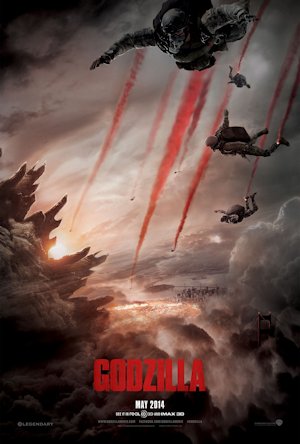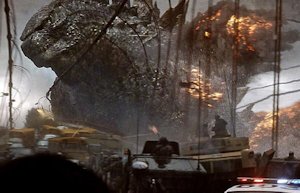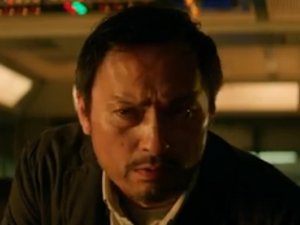Movie Review: Godzilla (2014)
 | | Godzilla |
A remarkable quality of Ishiro Honda's original Gojira is how, despite it being a heavy-handed parable about the dangers of nuclear testing and unchecked technological progress, the message is never delivered in an antagonistic way. While it is commonly believed that Honda failed to blame America by name due to residual political censorship following America's occupation, there is strong evidence to suggest that Honda's choice to never lay blame at anyone's feet was absolutely deliberate. As the years went on and Honda continued directing Godzilla movies well beyond the point where American/Japanese political relations could be harmed by artistic finger-pointing, the pattern was never broken. In an Ishiro Honda Godzilla movie, there are few human villians who are not relatable if not forgiveable. While he clearly lays blame at humanity's feet for the nuclear horrors of the Twentieth Century (for which Godzilla is his obvious analogue), he is careful not to give the impression that the problems of the world can be solved if only a few ignorants and evildoers are properly dealt with, as most preachy American sci-fi flicks tend to do.
This is the main reason why I strongly believe that Godzilla's late creator would approve of this year's Godzilla. This imagining of the Godzilla story does away with Godzilla's nuclear-bomb-powered origin story, but it preserves one of Ishiro Honda's core themes, as stated quite bluntly by this movie's Ishiro Serizawa (the first name is not a coincidence): "The arrogance of men is thinking nature is under their control and not the other way around." As with Honda's Godzilla films, this movie is unambiguously accusing humanity of flying Icarus' wings a little too close to the sun, but it never attacks the audience with obnoxious political posturing, unintelligent characters who fail to grasp the problem, or mustache-twirling villains who are evil for evil's sake. It shows Honda's vision an inordinate amount of respect, and it does his time-tested franchise justice.
In other words, this is a vast improvement over 1998's American Godzilla.
 | | The Honda is strong with this one |
It does this with more than just the sci-fi morality play at work. It also sticks to Honda's classic formula by nearly splitting the movie in two: there's the overarching giant monster tale (which I'll get back to later), but also a strong and focused human story. There's a personal and poignant message here, hammered in by the constant repetition of families ripped apart by events: the greatest devastation you can visit upon a man doesn't come from giant monsters, ruined buildings, or nuclear bombs, but by separating him from his family.
This story is largely told from the point of view of Ford Brody (Aaron Taylor-Johnson), a Navy Lieutenant who has no sooner returned to his family after fourteen months of combat than he has to fly off to Japan to get his seemingly crackpot father out of prison. His father, Joe (Bryan Cranston, with hair), is a former technician at a Japanese nuclear power plant where something unexplained went wrong fifteen years earlier, leading to the sudden death of his wife and Ford's mother. Joe is convinced that the governments of the world are covering up what really happened, but nobody--not even his son--believes him. Ford begrudgingly humors his father for one trip into the site of the disaster, and it is here where he starts to learn that Joe is right and is given a vision of what could happen to himself if he loses his family the way his father did.
Sufficed to say, the rest of the movie sees Joe caught up in a battle between giant monsters as it relocates across the Pacific, towards his waiting wife and young son in San Francisco. He is driven desperately to do "whatever it takes" to keep his family safe, and though his path's constant intersection with the Godzilla half of the story strains credibility a few times, it's still within the bounds of suspended disbelief that he would find himself facing off against everything nature and man can throw at him in order to maintain his family.
 | | Real Godzilla doesn't get stopped by a bridge |
Fans of the franchise, though, aren't going to be as interested in the exploits of one man trying to get his wife and son out of peril as they will be in the real star of the movie: Godzilla himself. This Godzilla has definitely put on some weight and height during his hiatus, but he deserves his name. Be warned, however, that the movie teases you almost endlessly before showing you this. This reboot makes it clear pretty early on that it is leading to a giant monster bout--that there is more than just Godzilla in the mix--but there are a couple of occasions where giant monster fights occur almost entirely off-camera. This would be an unforgiveable sin if it weren't for the fact that, when the movie finally delivers on its promise during the adrenaline-fueled climax, it does not disappoint. I have a feeling that, in the long run, this movie will gain a reputation for being too slow and not showing enough monster action, but I think that comes out of a genuine misunderstanding of what the more serious Godzilla movies are typically about.
And make no mistakes; this is a serious Godzilla movie, not an homage to the schlockier Godzilla we all know and love just as much. Like the original, this is, first and foremost, a sci-fi horror movie. It is scary and intense, not falling victim to the goofy stereotypes and tropes that plague the '98 version. Roland Emmerich's Godzilla makes the mistake of looking at Godzilla as nothing more than a disaster movie MacGuffin, and so it presents a movie full of light-hearted gags to offset the terror of the situation the asinine characters find themselves in. This Godzilla--like almost all Godzilla movies--still contains the awesome effects-heavy spectacle of a cataclysmic disaster film (and even some of the predictable character archetypes found therein) but it refuses to be defined by it.
This, in large part, is attributable to the characters and the actors who play them. All the characters are intelligent and rationally motivated. Where lesser Godzilla movies portray military types as mindless, blood-thirsty warmongers all too eager to ignore the wise scientist characters, for example, the main military voice in this Godzilla, Admiral William Stenz (David Strathairn, in one of his best roles since the Bourne films), is not a trigger-happy psychopath. He is contemplative but not slow, quick to act but not ignorant of the consequences of his decisions. Indeed, when he and Dr. Serizawa come to their predictable disagreement near the end, it is hard not to relate to the admiral's point of view.
 | | This is pretty much the only face he makes throughout the movie |
Dr. Ishiro Serizawa, though, despite being played by a fantastic actor in Ken Watanabe, is arguably the biggest disappointment. Watanabe spends the entire movie staring off into space as though operating on a different plane of reality. He is the spiritual voice of the movie (and of Ishiro Honda), but he seems exhausted, almost bored, during the entire thing. He lacks the tortured intensity of Akihiko Hirata's Dr. Serizawa from the original Gojira as well as the melancholy omniscience of Akira Takarada's Dr. Ogata from the same, even as his character strives to be an amalgamation of both. As the sole Japanese main character of the picture, perhaps I just expected more from him.
Taylor-Johnson as Ford Brody is a revelation as an everyman. He exhudes strength and confidence without devolving into an action hero, so that we can believe he has the wherewithall to survive while still sitting on the edge of our seats when he finds himself in danger. Bryan Cranston as his obsessed and broken father is equally well-cast, though his screen time is much too short. Less remarkable are the female leads, Elizabeth Olsen (who plays Ford's wife) and Juilette Binoche (who plays his mother). Neither actress is given enough to work with--especially Binoche--and they remain at the periphery of the story, serving as little more than plot points. The one plus is that the chemistry between Olsen and Taylor-Johnson is really good, and in the few scenes they share together, you believe that they are a real couple instead of a Hollywood approximation of one.
Actually, that's the best way to look at the movie as a whole: this is a real Godzilla movie, not a Hollywood approximation of one.
FINAL SCORE:





I'm not sure how an American version of Godzilla could be more awe-inspiring or respectful of the original film upon which it is based.
|
-e. magill 6/3/2014
|
|